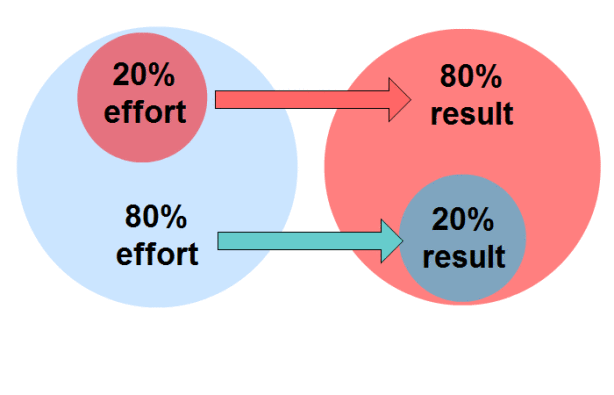
We often hear the word time management. There is no such thing as time management. I don’t understand how we manage something that is already set. Unless we miss understanding something whether we manage or don’t manage the time, it is always 24 hours in a day. It goes by itself. It’s not the time management that we need to work on but it is priority management. The 80 20 rule is quite handy when it comes to priority management.
The 80 20 rule is one of the most helpful concepts for life and time management and is also known as the Pareto Principle. This is considered to be the greatest time management tool from the 19th century economist Vilfredo Pareto.

According to this rule, 20 % of your activities will account for 80 % of your results. One day Pareto noticed that 20% of the pea plants in his garden generated 80% of the healthy pea pods. This observation caused him to think about uneven distribution. He thought about wealth and discovered that 80% of the land in Italy was owned by just 20% of the population. He investigated different industries and found that 80% of production typically came from just 20% of the companies. In other words, for many events, roughly 80% of the effects come from 20% of the causes.
We can take Pareto’s 80 20 rule and apply it to almost any situation. Understanding the principle is essential to learning how to prioritize your tasks, days, weeks, and months. If you observe carefully you will find Pareto principle all around you.
- 20% of roads will have 80% traffic jams
- 20% of the population will have 80% of the money
- 20% of people will have 80% of the influence
- 20% of the drinkers will consume 80% of alcohol
- 20% of students participate in 80% of classroom discussions
- 20% of customers will bring 80% of profits in business
- 20% of sales staff generates 80% of the sales
- 20% of the book contains 80% of the content
- 20% of your clothes worn 80% of the times
- 20% of the features cause 80% of the usage
- 20% of the staff generate 80% of the problems
- 20% of staff take 80% of management time
- 20% of your results come from 80% of your time
- 20% of people eat 80% of food in a picnic
- 20% of the most reported software bugs cause 80% of software crashes.
- 20% of patients account for 80% of healthcare spending
- 20% of mobiles apps will account for 80% your time on the phone
- And many more…
Hence invest your best in what matters the most.
To determine the top 20% of your priorities keep asking yourself a magic question – what do I have to do that no one else can do except me? and the rest should be delegated to others. Its bit funny but all your life you need to work hard to get yourself out of unimportant stuff and it is such a precious gift.
The Pareto Principle is a concept that suggests two out of ten items, on any general to-do list, will turn out to be worth more than the other eight items put together. The sad fact is that most people procrastinate on the top 10 or 20% of items that are the most valuable and important, the “vital few,” and busy themselves instead with the least important 80 %, the “trivial many,” that contribute very little to their success.
Here’s what we should do in order to effectively apply the 80/20 rule to setting smart goals which will boost your overall productivity. First, take a piece of paper and write down your goals. Then ask yourself: If you could only accomplish one of the goals on that list today, which one goal would have the greatest positive impact on your life?
Then pick the second most important goal. What you’ll find is, after you complete this exercise, you will have determined the most important 20% of your goals that will help you more than anything else. You should continue to work at those goals that you’ve chosen as the most valuable all the time.
Eat The Big one First:
You often see people who appear to be busy all day long but seem to accomplish very little. This is almost always because they are busy working on tasks that are of low value while they are procrastinating on the one or two activities that could make a real difference to their companies and to their careers. The most valuable tasks you can do each day are often the hardest and most complex, but the payoff and rewards for completing them can be tremendous.
Before you begin work, always ask yourself, “Is this task in the top 20% of my activities or in the bottom 80&?”. The rule for this is: resist the temptation to clear up small things first.
Always stay focused on your main goal:
Finally, I want to tell you about a study that has just been done about the attitudes of rich people versus poor people in regard to goal setting. What they found is that 85% of rich people have one big goal that they work on all the time. So, if you want to be wealthy, do what wealthy people do. Pick one big goal and work on it all the time, and if you do, it will change your life. If you choose to start your day working on low-value tasks, you will soon develop the habit of always starting and working on low-value tasks. You should Say ‘NO’ to many small things to say ‘YES’ to a few big things.
Having clarity of your desires and a clear vision for your future will help you stay focused on your goals every day. Focusing on your goals daily is actually one of the most important habits of successful people. No matter what your situation, it’s important to remember that there are only so many minutes in an hour, hours in a day, and days in a week. Pareto can help you to see this is a good thing; otherwise, you’d be a slave to a never-ending list of things to do.
Primary Resources:
- An article by Kevin Kruse in https://www.forbes.com
- An article by Brain Tracy https://www.briantracy.com
- John C Maxwell @ Developing a Leader within you 2.0
Like!! I blog frequently and I really thank you for your content. The article has truly peaked my interest.
Saved as a favorite, I like your web site!
Amazing this is very open with a clear explanation of the challenges. It was really informative.
I couldn’t resist commenting. Perfectly written! https://sportbookmark.stream/story.php?title=chicago-seo-company#discuss
Its such as you read my thoughts! You appear to grasp so much approximately this, like you
wrote the e-book in it or something. I think
that you can do with a few % to power the message home
a bit, but other than that, that is fantastic blog.
A fantastic read. I’ll definitely be back.
It’s in point of fact a nice and helpful piece of information. I am glad that you just shared this useful
info with us. Please keep us up to date like this. Thank you for sharing.
i like this outstanding post